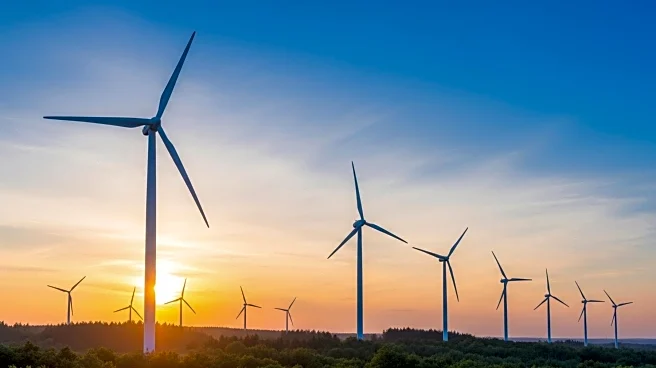What's Happening?
The Monsoon Wind Power Project in Laos has commenced electricity exports to Vietnam, marking the first cross-border renewable energy initiative in Asia. The 600-megawatt wind farm, located in southern Laos, began supplying power to Vietnam's national grid on August 22 under a 25-year agreement with Electricity of Vietnam (EVN). The project, which spans 68,000 hectares, involves 133 wind turbines connected to Vietnam's power grid via a 71-kilometer transmission line. Developed by Monsoon Wind Power Company Limited, the project represents a $950 million investment and took 14 years to develop. Financing was led by the Asian Development Bank, with contributions from several international financial institutions.
Why It's Important?
This development is significant for regional energy trade and sustainability efforts. By exporting renewable energy, Laos diversifies its energy sources beyond hydropower, while Vietnam enhances its renewable energy capacity. The project aligns with ASEAN's goals for power grid connectivity and cross-border electricity trade, supporting climate commitments and energy security objectives. The wind farm is expected to prevent approximately 1.3 million tonnes of carbon dioxide emissions annually, contributing to environmental conservation efforts. Additionally, the project created 1,600 jobs during construction, benefiting local communities economically.
What's Next?
The Monsoon Wind Power Project will continue to supply electricity to Vietnam under the long-term agreement, fostering ongoing collaboration between the two countries. The establishment of a community development fund will support local education, healthcare, and infrastructure, promoting sustainable development in surrounding areas. As Southeast Asian nations focus on renewable energy, similar projects may emerge, further enhancing regional energy trade and environmental sustainability.
Beyond the Headlines
The project highlights the potential for cross-border renewable energy initiatives to drive economic and social benefits. By avoiding resettlements and displacements, the development sets a precedent for ethical infrastructure projects. The community development fund underscores the importance of corporate social responsibility in large-scale energy projects, potentially influencing future developments in the region.










